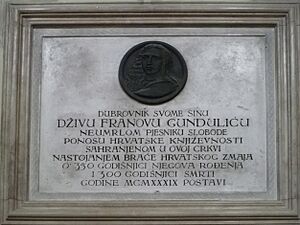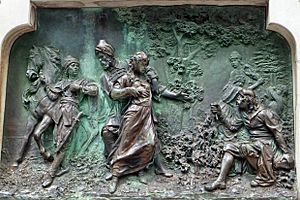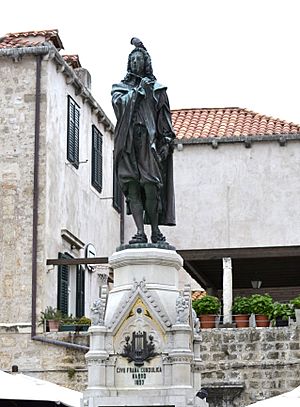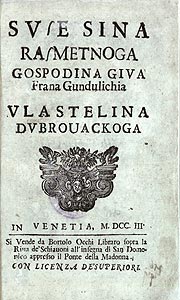Ivan Gundulić facts for kids
Quick facts for kids
Ivan Gundulić
|
|
|---|---|
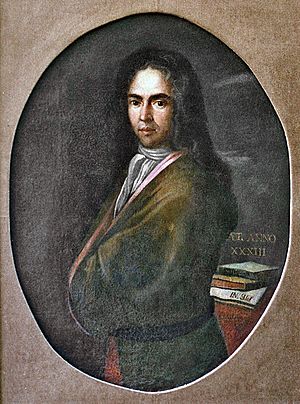 |
|
| Born | Dživo (Franov) Gundulić Giovanni Francesco Gondola 8 January 1589 Dubrovnik, Republic of Ragusa (Modern-day Croatia) |
| Died | December 8, 1638 (aged 49) Dubrovnik, Republic of Ragusa (Modern-day Croatia) |
| Pen name | Ivan Gundulić (from 19th century on) |
| Occupation | Poet |
| Citizenship | Republic of Ragusa |
| Period | Baroque |
| Notable works | Tears of the Prodigal Son, Osman, Dubravka |
Dživo Franov Gundulić, also known as Ivan Gundulić, was a very important Baroque poet from the Republic of Ragusa. This area is now part of Croatia. He is often called the Croatian national poet.
Gundulić's writings show ideas from the Catholic Counter-Reformation. This was a time when the Catholic Church was trying to renew itself. His works often talk about strong religious feelings and how worldly things are not lasting. His main works include the long poem Osman, the play Dubravka, and the religious poem Tears of the Prodigal Son. These works are famous for their rich and dramatic style.
Contents
Life of Ivan Gundulić
Ivan Gundulić was born in Dubrovnik on January 8, 1589. His family was wealthy and noble. His father was a senator and diplomat. Ivan received an excellent education, studying humanities and philosophy. He also studied law.
When he was 19, Ivan became a member of the Great Council of the Republic. He held many important jobs in the city government throughout his life. He even served as a temporary governor of Konavle twice.
Family Life and Career
At age 30, Ivan married Nicoleta Sorkočević. They had three sons and two daughters. His sons, Frano and Mato, later fought in a big war called the Thirty Years' War.
Ivan continued to work in government. He became a senator in 1636 and a judge in 1637. In 1638, he joined the Small Council. He passed away on December 8, 1638, from a fever. If he had lived longer, he might have become the knez (rector) of the Dubrovnik Republic, which was the highest position. His father had been knez five times, and his son Šišmundo later held the role four times. Ivan Gundulić was buried in the Franciscan church in Dubrovnik.
Gundulić's Famous Works
Ivan Gundulić started his writing career with poems and plays that were popular in Dubrovnik. However, he only published his longer, more important works. His earlier writings are now lost.
His first published works came out in 1621. These included his own versions of David's Psalms and other religious poems.
Tears of the Prodigal Son
In 1622, he wrote his famous poem Suze sina razmetnoga, which means Tears of the Prodigal Son. This poem has three parts: "Sin," "Insight," and "Humility." In it, Ivan explores important Christian ideas like sin, repentance, and being saved. He uses strong contrasts, such as life versus death and heaven versus hell.
Dubravka: A Play About Freedom
Gundulić's most famous play is Dubravka, written in 1628. It is a pastoral play, which means it's set in a peaceful countryside. In this play, he praises the past glory of Dubrovnik. It contains some of the most well-known lines in Croatian literature:
|
O liepa, o draga, o slatka slobodo, |
English Fair liberty, beloved liberty, liberty sweetly avowed, |
Osman: An Epic Poem
Osman is considered Gundulić's greatest work. In this long poem, he shows the differences between Christianity and Islam, Europe and the Turks, and freedom and slavery. The poem originally had 20 parts, called cantos, but two of them (the 14th and 15th) were never found.
Osman is a key example of Croatian Baroque literature from Dubrovnik and Dalmatia. It continues the tradition of praising fights against the invading Ottoman Turks, similar to the work of Marko Marulić. Besides celebrating Slavic people and their battles, Gundulić also describes the life of the Ottoman sultan Osman II. Gundulić often reminds readers that the world is always changing, like a "wheel of fortune."
The story of Osman begins with Sultan Osman's reaction to the Ottoman defeat at Chocim in 1621. It talks about how the past glory of Slavic nations like Bulgarians, Serbs, Hungarians, Albanians, and especially Poles could be brought back. In the story, Sultan Osman sends Ali-pasha to Poland to make peace. He also sends Kazlar-aga to find a Polish noblewoman for him to marry. Gundulić describes their journeys, focusing on the battle of Chocim and the suffering of enslaved Slavs under Ottoman rule. After many attempts to fix problems in his empire, the army captures Osman and executes him. They then bring the imprisoned Mustafa to be the new sultan.
Gundulić's Lasting Impact
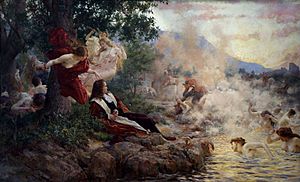
Osman was first printed in Dubrovnik in 1826. The two missing cantos were filled in by poems written by Petar Ignjat Sorkočević-Crijević, who was a direct descendant of Ivan Gundulić. The complete version of Osman was not published until 1844. At that time, the Illyrian movement, which aimed to unite South Slavs, chose Gundulić's works as a model for the Croatian language. Ivan Mažuranić, a leading figure in this movement, successfully finished the last two chapters of Osman that Gundulić had left incomplete.
A monument to Gundulić, created by sculptor Ivan Rendić, was unveiled on July 25, 1893, in Dubrovnik's main square.
In 1995, at a charity concert, the singer Bono recited the famous lines from Ivan Gundulić: "O liepa, o draga, o slatka slobodo" ("Oh beautiful, oh precious, oh sweet Liberty").
The opera Sunčanica was composed by Boris Papandopulo. Its story is based on Ivan Gundulić's Osman and his son Šišmundo Gundulić's continuation of the work. It was first performed in Zagreb in 1942.
Ivan Gundulić's picture is on the Croatian 50 kuna banknote, which was issued in 1993 and 2002.
List of Works
- Tears of the Prodigal Son – a poem (1622)
- Dubravka – a pastoral play (1628)
- Osman – a long epic poem
- Arijadna – a play (1633)
- Pjesni pokorne kralja Davida – a collection of poems (1621)
See also
 In Spanish: Ivan Gundulić para niños
In Spanish: Ivan Gundulić para niños
 | Toni Morrison |
 | Barack Obama |
 | Martin Luther King Jr. |
 | Ralph Bunche |


